Civil unrest and rocket attacks are not funny. But Israeli comedians — and the general public at large — are using the present emergency situation as fodder for jokes and memes galore.
“Looking for the comedy in this situation is the only way some people can handle the stress,” says Lior Halfon, a comedian/actor/entrepreneur/artist ever celebrated for his role as Itzko, a beloved character on the popular 2008–2014 Ramzor television series. “It’s a system of survival,” he explains.
SEE ALSO: Israeli Coronavirus-Themed Humor Is Unrestrained And Hilarious
This “system of survival” is why there’s a popular meme that reads: “The rest of the world is continuing its battle with COVID-19. Thank god, we’ve returned to our normal routine.”
It’s the reason there’s an oft-shared cartoon of people rushing to the bomb shelter and being asked at the entrance whether they’re vaccinated against COVID-19 before being let into safety.
Humor, after all, is a coping mechanism. Scientifically, it has been shown to be an antidote to crisis.
“Comedy, especially in times of crisis, is a tool,” says Halfon, one of Israel’s most successful creators at home and on the international stage. “It’s a tool to heal your soul. It brings out a lot of endorphins, the natural feel-good chemicals in your body. It can activate healthy physical and emotional changes in the body.”
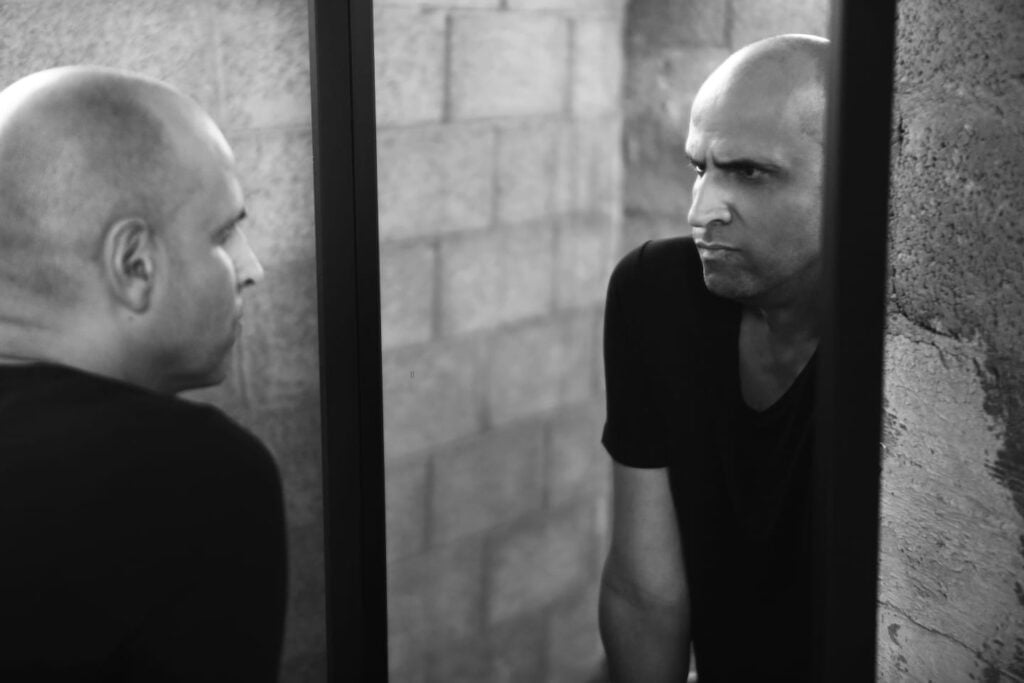
With panic and fear in the air, reframing the day-to-day situation is a serious task for the country’s funny people.
“I am 100 percent terrified of what’s to come, protecting my children, thinking about the other side, wondering if we’ll ever get back to a quieter time. But at the same time, I’m going to make as many jokes as possible, so that I can breathe in and out. It’s as essential as that for me,” says Jerusalem-based comedian Molly Livingstone.
Halfon concurs.
“Comedy is truly a medicine. In crisis, we are in stress and we can’t breathe. In laughter, we release our breathing. Laughter is a physical reaction that is essential in times of crisis,” the father of four tells NoCamels
The jokes and memes that are coming out of this catastrophe are fast, furious, and edgy.
A video of the Iron Dome defense system shooting down Hamas-launched missiles at central Israel zipped across social media and even to international news channels within moments of being recorded. Not long after, a second version of the same video went viral, this time replete with a Star Wars soundtrack.
“I’m never surprised at how quickly the jokes come out of a situation. I would only be surprised if they weren’t sooner. Honestly, it’s such Israeli mentality to go right into that coping mechanism of laughter, of humor. It’s so essential,” Livingstone tells NoCamels.
The wit coming out of this crisis may confound anyone who doesn’t live here. Israeli humor is dark. Nothing is sacred. It is taboo-breaking.
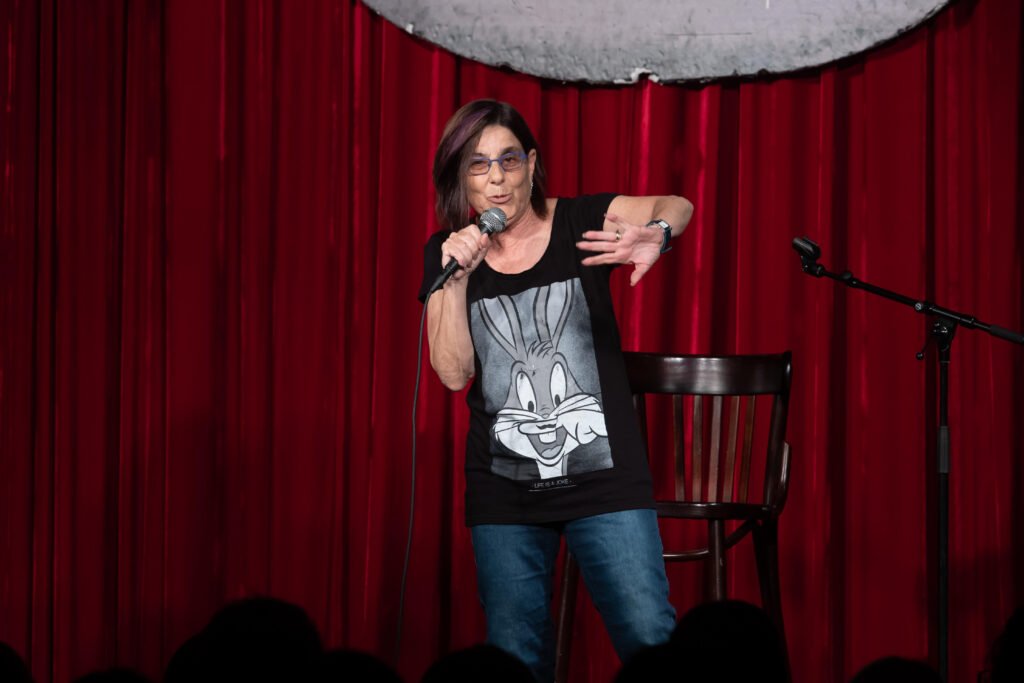
“Humor here is really dark. It’s more realistic humor, pointed and not cutesy,” says Kandi Abelson, a comedian and writer, who found herself entertaining strangers in a bomb shelter when sirens and rockets interrupted a standup comedy gig in Netanya. “It’s smart humor.”
There are no-holds barred.
It is why even youngsters take part in creating jokes on local WhatsApp and Facebook groups. One popular text shared among teen social media groups included a request to Hamas leaders to time the rocket attacks to coincide with school tests.
Another referred to Hamas, who give a window of time at which to expect missile attacks, as being like repairmen with their “expect attacks between 10-12.”
Sign up for our free weekly newsletter
Subscribe“Israeli humor doesn’t hide,” says Livingstone, who posts social media snippets of funny family incidents during the crisis. “Just like Israelis are very aggressive and pushy, the humor is more like that. Jewish humor is guilty but Israeli humor is aggressive. In a positive way. Just like we also know that being pushy, having chutzpah, may have a negative connotation, but really, it’s what helps us survive and succeed.
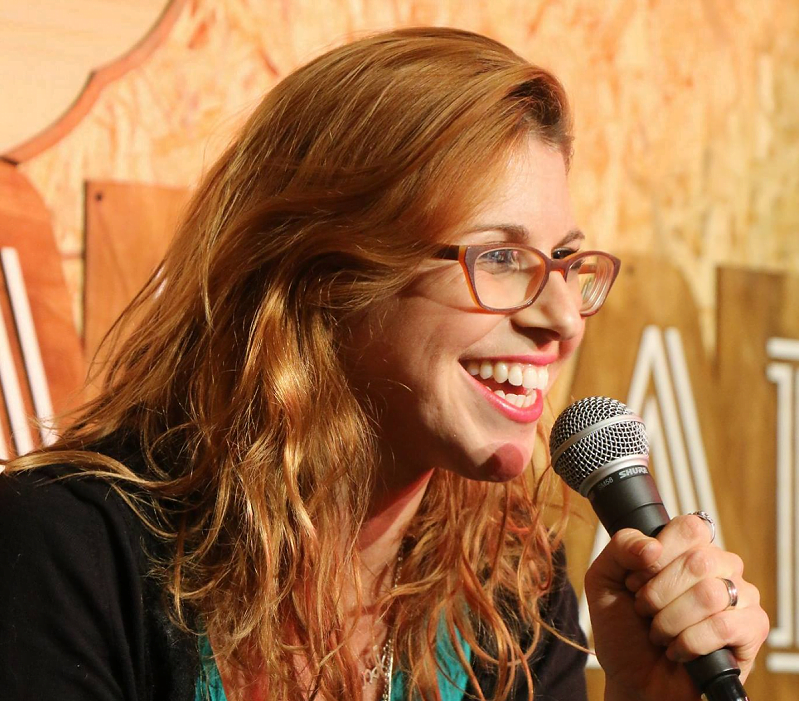
“And that’s true with the humor, too. The humor is not afraid to go ‘there.’ We’re not politically correct. We don’t hide… things are not insinuated; they are put out there.”
Benji Lovitt, an Israeli-American comedian, educator and writer, has been adding his own humorous takes on the situation to social media feeds. He doesn’t take sides, joking both about Home Front Command instructions and the aftermath of Hamas rocket attacks.
“I’ll never run out of things to laugh about here. It’s such a fraught situation, politically, domestically, internationally, there’s no shortage of stuff,” says Lovitt, who performs comedy gigs via Zoom. “Israeli humor is darker because life is darker. Almost no topic is off limits.”
It is dark humor but not degrading. Israeli crisis jokes give people facing catastrophe a release for negative emotions.
“You always want to punch up in comedy not punch down. Nobody’s making fun of victims of terror. That’s just us being a bully. Punching up means the target of the joke should be someone with more power than you. And the comedy is supposed to be a response to take back power, the psychological power,” Lovitt tells NoCamels. “I make fun of a situation because that makes people release tension. The whole point is to make people feel better.”
It is about perspective and using humor to see this devastating daily reality in a new way, to use humor to try and deal with these periods of crisis.
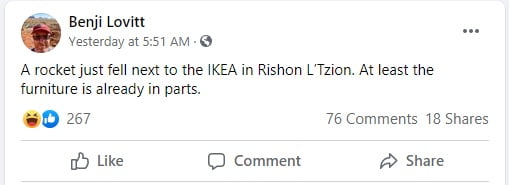
“Comedians often say things that everyone is thinking. If everyone is suffering or everyone’s thinking the same thing, then it’s not just me. The best comedy is relatable,” says Lovitt.
Indeed, no one is mocking the damage and deaths caused by the fighting. The rocket attacks and civil unrest are disturbing, not funny.

“No matter how much I’m laughing, I’m with 100 percent of the people on both sides being affected in the worst ways possible. I think of the children in Gaza just as much as I think about the children in Israel,” says Livingstone, echoing the views of all comics interviewed for this article.
And still there is room, even a need, for humor. Of course, comedy can be innocent amusement. But if there’s a crisis, there’s even more urgency for comedy.
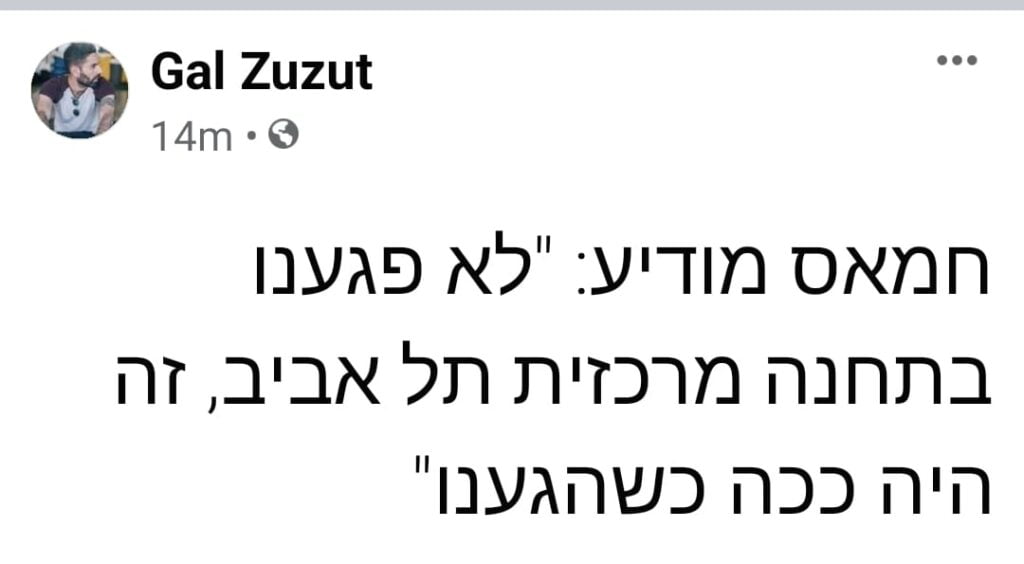
Abelson tells NoCamels that the people coming to her gigs – after relaxed Covid-19 rules went into effect and before the current wave of terror — were giddy with excitement at just being there.
“People are coming in [to the clubs] laughing so hard and listening so hard, they’re so happy to be out because we averted one crisis. We went through COVID-19 and we came out,” says Abelson, noting that she did six show last week to packed out audiences. “They were listening so well, and they were laughing so well. There was this huge release.”
!['Am I the only one bummed that Gaza had a metro and in Kfar Saba, people are still riding on the 567 [bus] line?,' reads a post published by Israeli playwright, producer, and director Reshef Levi.](https://nocamels.com/wp-content/uploads/2021/05/Hamas-metro-1024x895.jpg)
During the novel coronavirus lockdowns, humor was a go-to coping strategy for everyone. Puns and jokes zigzagged across the world via social media. The Israeli response to the crisis made headlines for its unrestrained and hilarious humor.
Two Israeli media researchers even published a thematic analysis of humor circulating on Israeli social networks that focuses on “hardship humor” and “parental humor” and the challenges parents, especially, face in times of crisis.
“It’s my only way to cope with my reality. If we don’t laugh, we’re gonna cry. I have a 10-year old with anxiety who is terrified of what’s going on right now. And it breaks my heart to see these kids going through this. But I’m going to make him laugh with me a little bit. Because it’s got to take the edge off,” says Livingstone. “The healthiest thing that I can do is to laugh.”

It’s humor in crisis.
And it is this quick wit that is so “essential, it is ‘the’ resource. It is the ‘live in the moment. Enjoy today,’” says Livingstone. “It is why we’re still one of the happiest countries in the world, despite being at constant conflict / war.”
Viva Sarah Press is a journalist and speaker. She writes and talks about the creativity and innovation taking place in Israel and beyond. www.vivaspress.com
Related posts

Rehabilitation Nation: Israeli Innovation On Road To Healing

Israeli High-Tech Sector 'Still Good' Despite Year Of War





Facebook comments